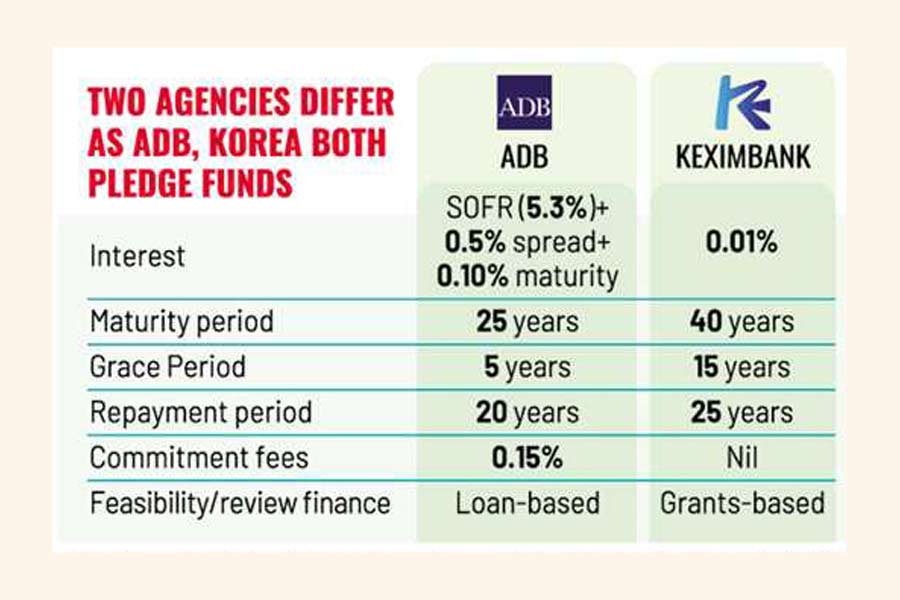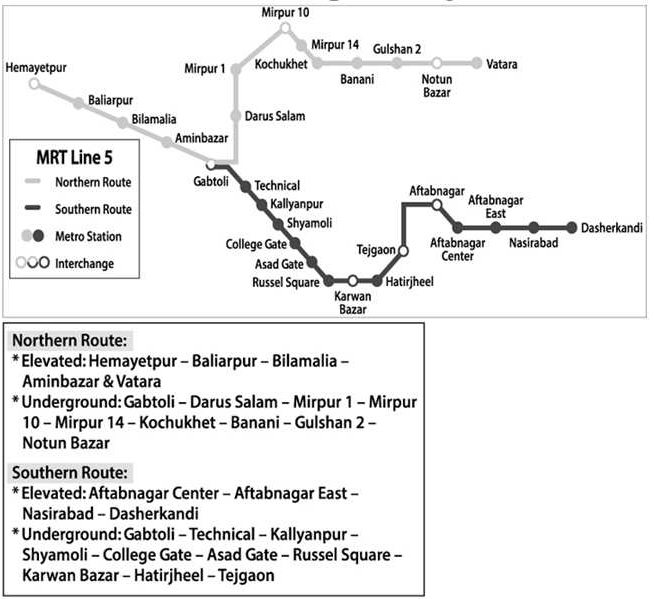
Published :
Updated :

Contentions between two government agencies over co-financing seem to have derailed and delayed construction woks on the southern metro-rail route styled MRT-5 Line under a US$4.8-billion project, sources said.
The project--seen vitally important for its east-west train communications through the crammed capital city--was initiated by the government-owned Dhaka Mass Transit Company Ltd (DMTCL) to build 17-kilometre metro-rail line connecting Gabtali with Dasherkandi.
Though the government planned starting the construction of this crucial up-ground- under-ground metro rail by January 2024, the conflicts of stance between the two government agencies concerned were impeding the start of construction.
A breakthrough looks be around of late. It took several months to resolve the tug-of-war as DMTCL, finally, agreed on co-financing by Korea, competent sources said. And it also sent PPA to the Korean EXIM Bank last month.
When contacted, a senior official of the DMTCL admitted that "the issue caused some disruption, but the delay is nominal".
Out of the 4.8 billon US dollars, the government plans to mobilise $3.33 billion from external sources and fund the rest from public coffer.
The implementing agency, DMTCL, stands opposed to co-financing and wants the Asian Development Bank as the sole external financer. The ADB already has pledged US$2.28 billion for this project.
But the Economic Relations Division favours co-financing for the project as South Korea had already sent a letter of intent to provide one billion dollars from their EDCF fund for the project in June this year.
The ERD says the loan terms of South Korea are much more favourable than ADB's as the interest rate is much lower.

Total incidence of ADB interest comes to 5.9 per cent inclusive of SOFR (5.3 pc), 0.5-percent spread and 0.10-percent maturity rate. The Korean interest rate is only 0.01 per cent.
The grace period of ADB is 5 years but it is 15 years for the Korean credit.
Similarly, the maturity period of ADB loan is 15 years while Korea's long 40 years.
Repayment period of the Korean EDCF is also longer--25 years-while it is 20 years for the ADB loan, the ERD authorities further mention to show comparative advantages.
"When the ERD communicated the DMTCL about the South Korean involvement, the company raised their reservations on several points, which, according to the ERD, are not acceptable," says one official.
Among the DMTCL arguments are (a) the ADB is interested to fund the project solely (b) the Korean technology is not of global standards (c) managing a co-financed project is difficult (d) involvement of another financer will delay the implementation.
Ruling out these arguments the ERD opines that the ADB has informed them that they are not interested to fund the total part of the project component. Thereafter, when the ERD started to contact several development partners, South Korea agreed to finance the project and sent the letter of intent.
"Now, if they are excluded from this project, the bilateral ties also may be strained," the officials were quoted to have opined.
About the DMTCL argument that Korea lacks international-standard technology, the ERD responded that already Korea had built metro-rail projects in Singapore, Thailand, Turkey, Malaysia and other countries, including their own.
Regarding the apprehensions of difficulties and delays in co-financed projects, the ERD said, "Many big projects are being implemented in the country smoothly through co-financing."
Rather, many projects which are being implemented with sole funding from the ADB are experiencing delays, they said, adding that "in 2022 only 11 per cent of the ADB projects here were on time".
And the ratio is same in 2023, they added about the time escalation.
The uniqueness of this metro-rail route is 11 of the stations--from Gabtali to Aftabnagar-- will be underground. And the rest of the 4 stations, from Aftabnagar to Dasherkandi, will be elevated.
mirmostafiz@yahoo.com


 For all latest news, follow The Financial Express Google News channel.
For all latest news, follow The Financial Express Google News channel.